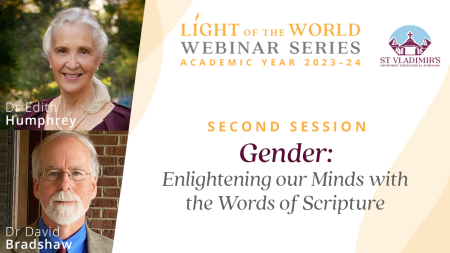Daily Vespers
Daily Vespers
Daily Matins
Daily Matins
Daily Matins
Divine Liturgy
All-night Vigil
Second Session in New Light of the World Webinar Series Defines Gender According to the Words of Scripture

The second session in the Light of the World Webinar Series was co-hosted by Dr Edith M. Humphrey, SVS Press Author and Professor Emerita of New Testament at Pittsburgh Theological Seminary, and Dr David Bradshaw, Professor of Philosophy at the University of Kentucky, on the topic, “Gender: Enlightening Our Minds with the Words of Scripture”. The online event was held on Tuesday, November 14, 2023, from 7:00-8:30 p.m. EST, via Zoom live stream.
Dr Bradshaw started the webinar with an overview of the Old Testament teachings on gender, beginning with the creation account in Genesis. In Genesis, said Dr Bradshaw, God creates man through a statement that refers to the relationship between the members of the Holy Trinity, “Let us make man in our image” (Gen. 1.26). Then, man becomes the first part of God’s creation which receives a companion with whom he is to live in relationship, the woman. Dr Bradshaw also emphasized the presence of many strong female characters throughout the Old Testament, a representation that is not replicated in contemporary accounts of creation.
Following Dr Bradshaw’s talk, Dr Humphrey emphasized the importance of viewing the Scriptures as enlightening our understanding of gender and sexuality, rather than simply regulating or constraining it. Dr Humphrey gave detailed examples of the many ways gendered language is used in the New Testament, defining gender as much more than a “mere social construct,” but rather as something “something given, and bigger than our biological sexuality.” Referring to the writings of St Paul, as well as other church theologians, Dr Humphrey laid out a framework for reading and understanding the texts in the New Testament which deal with challenging topics such as how we talk about God, the mystery of mutuality and order in the family, homoeroticism, and celibacy.
Seminary President, the Very Rev. Dr Chad Hatfield, moderated the Q&A session following the speakers’ presentations, during which the presenters thoughtfully answered fifteen listener questions. He thanked the speakers for agreeing to take on such a challenging topic, saying, “There were many questions raised that we could discuss all night, or even teach a full semester course about. We thank both Dr Bradshaw and Dr Humphrey for speaking so eloquently on a topic that many St Vladimir’s friends and benefactors have asked us to address.”
Chief Advancement Officer and webinar orchestrator, Sarah Werner, also thanked the speakers for their thoughtful and insightful talks and encouraged listeners to support the students at St Vladimir’s Seminary by making a donation to the scholarship fund at svots.edu/give.
Next month’s webinar will be titled “Darkness into Light: Working through Grief During the Holiday Season”, featuring SVS Press authors Dr Daniel Hinshaw (University of Michigan School of Medicine, SVOTS) and Dr Sarah Byrne-Martelli (D.Min. ‘19), held on Thursday, December 14, 2023, from 7:00 p.m. to 8:30 p.m. EST.
To watch the recording of the second session of the Light of the World Webinar Series, “Gender—Enlightening Our Minds with the Words of Scripture”, click the link below.
About the Light of the World Webinar Series
This monthly webinar series features speakers from among St Vladimir’s Seminary faculty, alumni, and friends, speaking on a variety of topics while answering a core question:
How are we Christians to be the light of the world?
Drawing inspiration from feedback received through a recent survey, these webinars aim to address a diverse range of themes that address real and pressing issues facing Orthodox faithful in modern society.
These online webinars are open to the public and free of cost. They are recorded and uploaded to the St Vladimir’s Seminary YouTube channel after the live Zoom event for easy access.
Gender: Enlightening Our Minds with the Words of Scripture
Join us for the second webinar in The Light of the World Webinar Series. This monthly webinar series will feature speakers from among St Vladimir’s Seminary faculty, alumni, and friends, speaking on a variety of topics while answering a core question:
How are we Christians to be the light of the world?
Drawing inspiration from feedback received through a recent survey we conducted, these webinars aim to address a diverse range of themes that address real and pressing issues facing Orthodox faithful in modern society.
The second webinar in the Light of the World Webinar Series will be co-hosted by Dr Edith Humphrey, SVS Press Author and Professor Emerita of New Testament at Pittsburgh Theological Seminary, and Dr David Bradshaw, Professor of Philosophy at the University of Kentucky, on the topic, Gender: Enlightening Our Minds with the Words of Scripture. This webinar will be held on Tuesday, November 14, 2023, from 7:00 - 8:30 p.m. Eastern, via Zoom livestream.
The online webinar is open to the public and free of cost. It will be recorded and uploaded to our YouTube channel afterward for easy access. Click the button below to register and to receive the Zoom webinar link.
